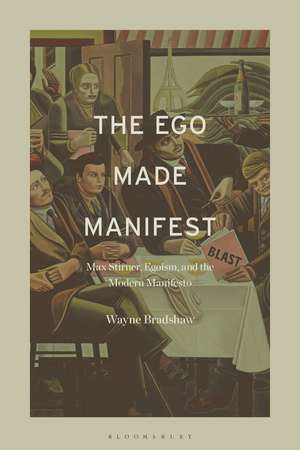The Ego Made Manifest: Max Stirner, Egoism, and the Modern Manifesto
Autor Dr. Wayne Bradshawen Limba Engleză Hardback – 4 oct 2023
Preț: 538.92 lei
Preț vechi: 773.16 lei
-30% Nou
Puncte Express: 808
Preț estimativ în valută:
103.12€ • 107.67$ • 85.35£
103.12€ • 107.67$ • 85.35£
Carte tipărită la comandă
Livrare economică 05-19 aprilie
Preluare comenzi: 021 569.72.76
Specificații
ISBN-13: 9798765102565
Pagini: 224
Dimensiuni: 152 x 229 mm
Greutate: 0.46 kg
Editura: Bloomsbury Publishing
Colecția Bloomsbury Academic
Locul publicării:New York, United States
Pagini: 224
Dimensiuni: 152 x 229 mm
Greutate: 0.46 kg
Editura: Bloomsbury Publishing
Colecția Bloomsbury Academic
Locul publicării:New York, United States
Caracteristici
Reveals the true extent of Max Stirner's influence, not in radical political circles, but in the arts
Notă biografică
Wayne Bradshaw is Adjunct Research Associate in the College of Arts, Society and Education at James Cook University, Australia. He holds a PhD in literary studies and the history of ideas and researches egoism's influence on modernist literature.
Cuprins
PrefaceAcknowledgmentsIntroduction: Manifestations of the Ego1. Germany: Stirner's Conquest of the Self2. France: The Rise of Literary Egoism3. Italy: The Ascent of the Poet Tyrant4. The Transatlantic Shift: Beyond Anarchism and Nationalism5. England: From Imagism to VorticismConclusion: A History of PossessionWorks CitedIndex
Recenzii
This work is a masterpiece in the history of ideas and on Max Stirner, a highly significant and all-too-neglected 19th-century figure. The breadth and depth of original scholarship is striking. Written in refreshingly clear and elegant prose, Bradshaw presents difficult and complex ideas with clarity and flair, balance and judgment.
Stirner and egoism have always been at the heart of the historical avant-garde, and that is perhaps most evident in the anarchic, polemical spirit of the avant-garde manifesto. Bradshaw's book is a vital and timely contribution to the study of the manifesto genre and early 20th-century intellectual culture.
The ghost of Max Stirner walks! The spook of the rogue Hegelian, ostensibly exorcised forever by Karl Marx, returns again in Wayne Bradshaw's magnificent study of Max Stirner's Egoism and the Modern Manifesto, The Ego Made Manifest. Though long overlooked, Stirner's Egoist philosophy had a profound impact on European Modernism, in the formative years prior to WWI, and here Bradshaw adeptly traces its influence in Germany, France, Italy, US and United Kingdom, achieving the most complete international picture so far of this 'History of Possession.' As essential for gaining an understanding of Modernist theory and practice as the familiar entry-level knowledge concerning the stream-of-consciousness of William James, Stirner's Egoism is as yet entirely unknown to the vast majority of readers, even to scholars in the field of Modernist Studies. Bradshaw's wonderful book might well effect a profound reevaluation of everything we thought we knew about this subject. The Ego Made Manifest is a must-read for anyone with a serious interest in Modernist literature.
Stirner and egoism have always been at the heart of the historical avant-garde, and that is perhaps most evident in the anarchic, polemical spirit of the avant-garde manifesto. Bradshaw's book is a vital and timely contribution to the study of the manifesto genre and early 20th-century intellectual culture.
The ghost of Max Stirner walks! The spook of the rogue Hegelian, ostensibly exorcised forever by Karl Marx, returns again in Wayne Bradshaw's magnificent study of Max Stirner's Egoism and the Modern Manifesto, The Ego Made Manifest. Though long overlooked, Stirner's Egoist philosophy had a profound impact on European Modernism, in the formative years prior to WWI, and here Bradshaw adeptly traces its influence in Germany, France, Italy, US and United Kingdom, achieving the most complete international picture so far of this 'History of Possession.' As essential for gaining an understanding of Modernist theory and practice as the familiar entry-level knowledge concerning the stream-of-consciousness of William James, Stirner's Egoism is as yet entirely unknown to the vast majority of readers, even to scholars in the field of Modernist Studies. Bradshaw's wonderful book might well effect a profound reevaluation of everything we thought we knew about this subject. The Ego Made Manifest is a must-read for anyone with a serious interest in Modernist literature.
